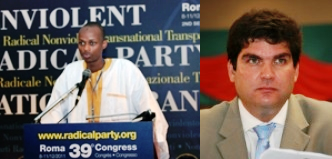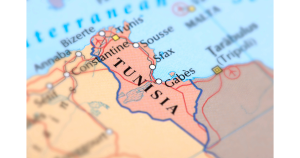
This 17 July, as we celebrate the anniversary of the adoption of the Rome Statute, the founding treaty of the International Criminal Court (ICC), and International Criminal Justice Day, it is appropriate for us activists who fought determinedly for the establishment of the ICC, to survey the 10 years of operation of this essential instrument against impunity for the most serious crimes, which threaten the peace, security and well being of the world and shake the conscience of humanity.
The world today is far different than it was 10 years ago. Victims of atrocious crimes now have the possibility of receiving justice by having those who bear the greatest responsibility in criminal planning or incitement brought to account. This has been demonstrated by the verdict and 14-year sentence pronounced against Thomas Lubanga, founder and former commander-in-chief of the Patriotic Force for the Liberation of Congo (Forces Patriotiques pour la Libération du Congo, FPLC) and founder of the Congolese Patriotic Union. The ICC can play a crucial role in deterring those who would commit grave crimes in violation of international law, such as enlistment or conscription of child soldiers in armed conflict. Similarly, by issuing arrest warrants for high dignitaries, including heads of State like Sudanese President Omar Al Bashir, the ICC participates in sending a clear and firm message: regardless of rank, you will be held accountable for your acts. In other words, impunity is no longer an option for those who would take power or maintain it by violence, committing massive human rights and international law violations.
An instrument of final resort, the ICC acts only when a competent State is unwilling or unable to investigate and prosecute the most serious crimes of international concern, committed within the State’s national jurisdiction. By virtue of the principle of complementarity on which the ICC is founded, States bear primary responsibility of investigating and prosecuting crimes that come within the competence of the Court. Once the Court’s jurisdiction has been activated, its effectiveness depends on the full cooperation of the international community, and, especially, on States parties to execute its operations and decisions.
To date, a number of arrest warrants remain unexecuted, however, due to the unwillingness of certain States parties to support, in accord with their obligations, the application of ICC decisions. In 2011, a number of States parties to the ICC violated their obligations under the Rome Statute by receiving Omar Al Bashir with impunity on their territory. By acting in this way, these States disregarded their commitment to be on the side of the victims and not of their torturers. By harbouring a presumed and wanted war criminal, they repudiated the rights of the people of Sudan and Darfur to reparations and the establishment of truth and justice. On the contrary, Malawi’s recent and brave decision not to host the July 2012 summit of the African Union over the attendance of Omar Al Bashir, exemplifies progress in the kind of cooperation that is expected of States.
In the same vein, we can only regret and condemn the approval given by the African Union to those States that have refused to cooperate with the ICC, an act which flagrantly contradicts the commitment inscribed in the AU’s Constitutive Act, to combat impunity and fight for international criminal justice. Additionally, the arguments raised to justify this decision are at the very least troubling if not deceptive. To African detractors of the ICC who see in it a biased instrument, I wish to say the following: African States are not the preferred targets of the ICC but its primary users. In fact, African States have not only been a driving force and played a crucial role in the establishment of the ICC, but they have also turned out to be the most active in voluntarily referring to the Court cases of mass violations of international law committed in their territories. In so doing, the Democratic Republic of Congo, Uganda and the Central African Republic recognised the usefulness of the Court.
In the same way today, we find it necessary and urgent that the ICC act in Mali to determine whether war crimes and crimes against humanity have been committed there since the onset last January of the crisis into which the country has plummeted. Different sources, including high level United Nations officials, have reported that war crimes, namely the massacre of Malian loyalist soldiers in Aguel-hoc, the conscription of child soldiers, and violence, such as murders, kidnappings and rape against civilians, have been committed by different armed groups occupying the country’s north. This warrants, at the very least, opening a preliminary investigation, and we call on the new Prosecutor, Mrs. Fatoumata Bensouda, to act to this end.
If the States parties and the international community have an essential role in ensuring that the ICC does not become ineffectual, the ICC must also improve its work methods. The ICC cannot expect to be effective in its investigations and proceedings merely through its presence at The Hague. Expanding the number of field offices and increasing collaboration with human rights defenders and affected communities within situation countries would undeniably allow the ICC to surpass its limitations or faults and to respond in a manner that is adequate to the nature or extent of crimes committed.
Providing outreach to concerned populations, encouraging victim participation, especially of the most vulnerable, such as women and children, from the start is also an important means by which to fulfil the most important role of the Court’s mandate: providing a sense of shared justice and a major understanding of its work to the victims of the crimes it plans to pursue and adjudicate. This is equally crucial to ensuring a legacy or long-term gains in the concerned countries with the goal of establishing lasting peace and the legally constituted State.
No matter how imperfect or incomplete the ICC’s mechanisms, they contribute to the realisation of an ideal for which we radical activists have fought and continue to fight with tenacity. They are also the fruits and embodiment of a deep-seated conviction that we never cease to assert: peace (lasting and true, founded on the primacy of law) and justice, far from opposing one another, are two sides of the same coin. The return of one cannot happen without the full assertion of the other in countries wounded by conflict, where violence has run rampant.
- Read the Op Ed as published in Slate Afrique, 17 July 2012 (French)
- Read the Op Ed as published in Le Soir (Belgium), 17 July 2012 (French)
- Download the Op Ed in pdf format: Slate Afrique, Le Soir
*Demba Traoré is a Malian Lawyer, former parliamentarian and the Secretary General of the Nonviolent Radical Party, Transnational and Transparty, Niccolo’ Figa-Talamanca is Secretary General of No Peace Without Justice



